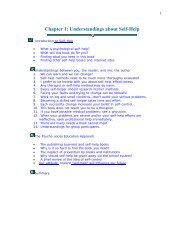Methods for Changing Behaviors - Psychological Self-Help
Methods for Changing Behaviors - Psychological Self-Help
Methods for Changing Behaviors - Psychological Self-Help
Create successful ePaper yourself
Turn your PDF publications into a flip-book with our unique Google optimized e-Paper software.
In the case of an obsession, say lusting <strong>for</strong> a coworker, or a worry,<br />
it is possible that this unwanted thought results from your repeatedly<br />
suppressing it and then letting it happen. When this is the history, it<br />
may help to let the fantasy or worry run its course. You could even<br />
insist that it occur frequently <strong>for</strong> a day or two. If the thought is<br />
dangerous, however, see a therapist.<br />
STEP THREE: Continue the unwanted behavior until it is very<br />
unpleasant or disgusting or loses its strength.<br />
Hopefully at that point the habit will be punished enough that it is<br />
extinguished. Watching yourself in a mirror might increase your<br />
distaste <strong>for</strong> a habit, like nail biting. In other cases, the worry or<br />
obsession fades away when you demand that it continue. A strong<br />
habit or worry may not go away easily; however, so several attempts<br />
to satiate-to-exhaustion might be required.<br />
Most people are so busy fighting the habit that it doesn't occur to<br />
them to change sides and "go with this desperate need." See<br />
paradoxical intention in chapter 14. Also, most of us avoid selfpunishment,<br />
even if it is <strong>for</strong> a good cause.<br />
Obsessions are hard to eliminate; success rates with these<br />
techniques are about 50% but this is with extreme cases. There is<br />
almost no research with common compulsions, such as perfectionism,<br />
indecisiveness, rule-boundness, stinginess, workaholism, etc.<br />
It is a simple idea, sort of "turning the tables." There are some<br />
dangers, especially with destructive obsessions. Therapists may<br />
encourage a person to dwell on and try to convince him/herself of the<br />
validity of ideas like "I'm going crazy" or "I'd be better off dead." The<br />
assumption (and hope) is that the contrary, rebellious part inside of us<br />
will suddenly start to oppose the dangerous idea instead of pushing it<br />
as be<strong>for</strong>e. That is too risky to do by your self without professional<br />
help. Yet, the approach could be used with less dangerous thoughts,<br />
like "I'm going to fail" or "He/she is probably going out on me." By the<br />
way, sarcasm might help, <strong>for</strong> instance, the falsely accused partner<br />
could say, "Yes, I went to bed with three people last night." People<br />
have found that repeatedly denying the accusations and saying, "I love<br />
you, of course I don't have affairs, it's a silly idea, don't say such<br />
things, ..." are usually ineffective (Fay, 1978).<br />
Additional reading<br />
Lichtenstein, E. & Danaher, B. G. (1976). Modification of<br />
smoking behavior: A critical analysis of theory, research, and<br />
practice. In M. Hersen, R. M. Eisler, & P. M. Miller (Eds.),<br />
Progress in Behavior Modification, Vol. 3, New York: Academic<br />
Press.<br />
Frankl, V. (1965). The doctor and the soul. New York: Knopf.<br />
1112












